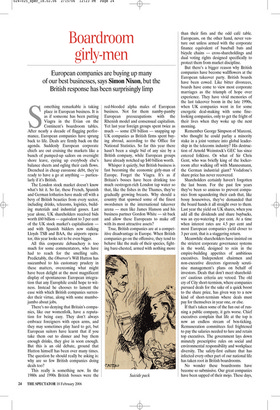Boardroom girly-men
European companies are buying up many of our best businesses, says Simon Nixon, but the British response has been surprisingly limp Something remarkable is taking place in European business. It is as if someone has been putting Viagra in the Evian on the Continent’s boardroom tables. After nearly a decade of flagging performance, European companies have sprung back to life. Deals are firmly back on the agenda. Suddenly European corporate chiefs are out cruising the markets like a bunch of pumped-up sailors on overnight shore leave, eyeing up everybody else’s balance sheets and ogling their cash flows. Drenched in cheap eurozone debt, they’re ready to have a go at anything — particularly if it’s British.
The London stock market doesn’t know what’s hit it. So far, these French, Spanish and German lotharios have made off with a bevy of British beauties from every sector, including drinks, telecoms, logistics, building materials and industrial gasses. Last year alone, UK shareholders received bids worth £60 billion — equivalent to 3 per cent of the UK stock market’s capitalisation and with Spanish bidders now stalking Lloyds TSB and BAA, the airports operator, this year looks set to be even bigger.
All this corporate debauchery is too much for some commentators, who have had to reach for the smelling salts. Predictably, the Observer’s Will Hutton has succumbed to his customary prudery in these matters, overcoming what might have been delight at the most magnificent display of spontaneous European integration that any Europhile could hope to witness. Instead he chooses to lament the ease with which British companies surrender their virtue, along with some mumbojumbo about jobs.
There’s no denying that Britain’s companies, like our womenfolk, have a reputation for being easy. They don’t always embrace foreigners with open arms, and they may sometimes play hard to get, but European suitors have learnt that if you take them out to dinner and buy them enough drinks, they give in soon enough. But this is an old debate, ground that Hutton himself has been over many times. The question he should really be asking is: why are so few British companies doing deals too?
This really is something new. In the 1980s and 1990s British bosses were the red-blooded alpha males of European business. Not for them namby-pamby European preoccupations with the Rhenish model and consensual capitalism. Yet last year foreign groups spent twice as much — some £50 billion — snapping up UK companies as British firms spent buying abroad, according to the Office for National Statistics. So far this year there hasn’t been a single bid of any size by a British company, while European groups have already notched up $40 billion worth.
Whisper it quietly, but British business is fast becoming the economic girly-man of Europe. Forget the Viagra. It’s as if Britain’s bosses have been drinking too much oestrogen-rich London tap water so that, like the fishes in the Thames, they’re gradually growing breasts. Why should a country that spawned some of the finest swordsmen in the international takeover arena — men like James Hanson and his business partner Gordon White — sit back and allow these Europeans to make off with its most attractive assets?
True, British companies are at a competitive disadvantage in Europe. When British companies go on the offensive, they tend to behave like the male of their species, fighting bare-chested, armed with nothing more than their fists and the odd café table. Europeans, on the other hand, never venture out unless armed with the corporate finance equivalent of baseball bats and bicycle chains — cross-shareholdings and dual voting rights designed specifically to protect them from market discipline.
But there’s a bigger reason why British companies have become wallflowers at the European takeover party. British boards have been cowed. Like bitter divorcees, boards have come to view most corporate marriages as the triumph of hope over experience. They have vivid memories of the last takeover boom in the late 1990s, when UK companies went in for some energetic deal-making with some finelooking companies, only to get the fright of their lives when they woke up the next morning.
Remember George Simpson of Marconi, who thought he could parlay a minority stake in a joint venture into global leadership in the telecoms industry? His destruction of Arnold Weinstock’s GEC has since entered folklore. Or what of Sir Chris Gent, who was briefly king of the lockerroom after walking off with Mannesmann, the German industrial giant? Vodafone’s share price has never recovered.
Shareholders certainly haven’t forgotten the last boom. For the past few years they’ve been so anxious to prevent companies from squandering their cash that, like bossy housewives, they’ve demanded that the board hands it all straight over to them. Last year the yield on UK shares, when you add all the dividends and share buybacks, was an eye-watering 8 per cent. At a time when interest rates are 4.5 per cent and most European companies yield closer to 3 per cent, that is a staggering return.
Meanwhile shareholders have insisted on the strictest corporate governance systems in the world, designed to rein in the empire-building appetites of ambitious executives. Independent chairmen and non-executive directors rigorously scrutinise management’s plans on behalf of investors. Deals that don’t meet shareholders’ cautious criteria are vetoed. The old cry of City short-termism, where companies pursued deals for the sake of a quick boost to the share price, has given way to a new kind of short-termism where deals must pay for themselves in year one, or else.
If that’s taken some of the fun out of running a public company, it gets worse. Chief executives complain that life at the top is now an endless stream of box-ticking. Remuneration committees feel frightened to pay the salaries needed to lure and retain top executives. The government lays down minutely prescriptive rules on social and environmental responsibility and workplace diversity. The safety-first culture that has infected every other part of our national life has taken root in British boardrooms.
No wonder these boardrooms have become so submissive. Our great companies have been sapped of their mojo. These days, any ambitious young executive with cojones wants to work in private equity, where you are paid handsomely to take huge risks out of the public eye. That’s where you’ll find today’s Hansons — pulling off audacious deals on behalf of their investors, who are usually wealthy private individuals rather than the big institutions.
Does this matter? Not if it means that British public companies are avoiding the kind of disastrous liaisons that got them into so much trouble before. Businesses do nobody any favours — least of all those who may rely on dividends to pay their pensions — by overpaying for foreign acquisitions if they later run into trouble. And if European companies want to come to Britain and pay stupid prices for our companies, then more fool them — we’ll find more productive ways to invest the cash.
Besides, as good capitalists, we know that ownership doesn’t matter. We don’t care whether we call the top man ‘boss’ or ‘el jefe’ — just so long as he’s happy for us to talk to him in English. We’re grown up enough to understand that ownership in today’s global economy is a nebulous concept. We rejoice that when a dentist in Cheshire pays into his pension fund, the money might very well be invested by a fund manager in New York in the shares of a Belgian-listed company run by a Brazilian.
What’s more, we recognise the huge benefits that foreign investment has brought to Britain. There are hardly any British investment banks of any stature in London, yet the City is the financial capital of the world. There are no UK volume car manufacturers, yet Britain builds more cars than any other EU country. If Will Hutton had his way, we’d still be driving Morris Marinas and waiting six months for a phone line.
But that doesn’t mean we should be complacent. We need to ask ourselves whether this new British reluctance to invest overseas is indicative of a wider dysfunction. The truth is that British companies aren’t just refusing to spend money abroad, they’re failing to invest in Britain too. On some measures, capital expenditure fell to its lowest level in 20 years in 2004, according to Morgan Stanley. This is deeply troubling. Shorn of investment, economic growth will slow, fewer jobs will be created and there will be less profit to pay the pensions of the next generation of pensioners.
Perhaps British bosses’ new self-control is a sign that they have grown up. But it’s hard to avoid the conclusion that they have simply gone soft. We urgently need our corporate chiefs to rediscover their swagger. The next time they find themselves sitting around the same boardroom table as a European rival, they should watch carefully to see which bottle he drinks from and then knock back the rest themselves.



















































































 Previous page
Previous page